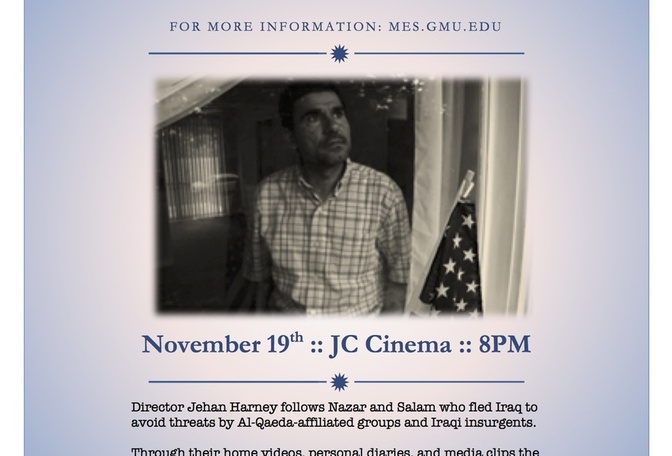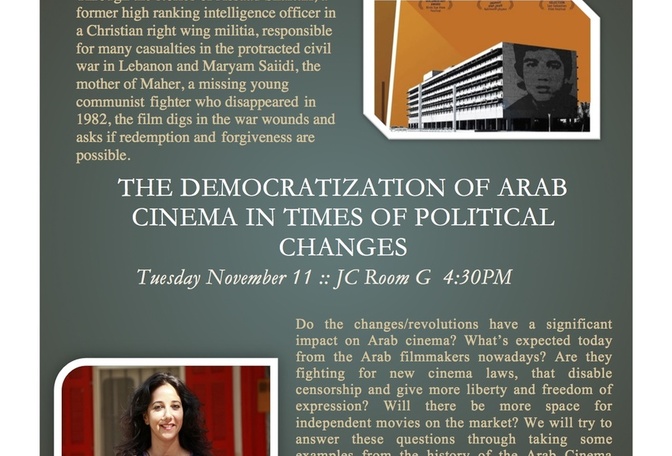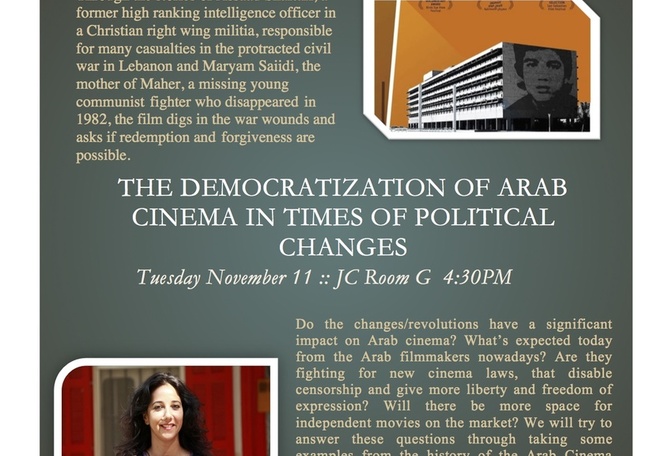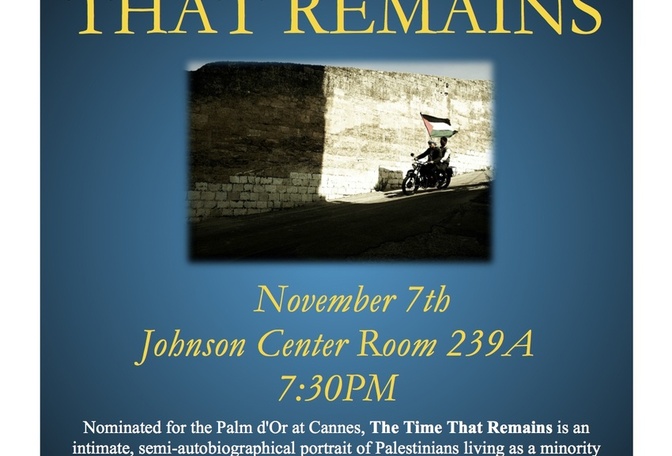- FAMA
- Researchers
-
Projects
- MESPI
- Knowledge Production Project >
-
Political Economy Project
>
- Development and the Uprisings
- Class Formations and Dynamics
- The Palestinian Economy: Fragmentation and Colonization
- Tunisia: A Political Economy in Transition
- Migrant States, Mobile Economies: Rethinking the Political in Contemporary Turkey
- Political Economy of the Middle East: Continuities & Discontinuities in Teaching & Research
- 2016 Political Economy Institute
- The Lebanon Project >
- The Palestine Project >
- The Civil Society Project >
- Middle East Media Project >
- The Egypt Project >
- Refugees and Migrants Project >
- Black-Palestinian Transnational Solidarities Project
- Initiatives
- Events
- Summer Institutes
- Internships
- Blog
|
November 19, 2014 @ 8:00pm
JC Cinema George Mason University Fairfax, Virginia Presented by the Middle East Studies Program, Arab Studies Institute, and Middle East Etc. Film Club Ten years after the US-led war in Iraq, thousands of displaced Iraqi refugees are still facing a crisis in the United States, yet their personal stories have been under reported in mainstream news. Director Jehan Harney follows Nazar and Salam who fled Iraq to avoid threats by Al-Qaeda-affiliated groups and Iraqi insurgents that see them as “traitors” for supporting US forces in Operation Iraqi Freedom. Once in the U.S., however, they find themselves without any resources or support, wondering in the end if their sacrifice was all worth it. Through their home videos, personal diaries, and media clips the film intimately captures their emotional, psychological, and physical struggles as they reconcile their hopes for a liberated Iraq with the harsh reality of refugees without a stable home. The Lost Dream is produced by ITVS and executive produced by Oscar-nominated documentarian (My Country, My Country) Laura Poitras.
0 Comments
November 11, 2014 @ 4:30pm
Johnson Center Room G George Mason University Fairfax, Virginia Presented by the Middle East Studies Program, Arab Studies Institute, and Middle East Etc. Film Club Featuring... Eliane Raheb, director Do the changes/revolutions have a significant impact on Arab cinema? And if yes how? Is it in its form, content, language or institutions? What’s expected today from the Arab filmmakers nowadays? Are they fighting for new cinema laws, that disable censorship and give more liberty and freedom of expression? Will there be more space for independent movies on the market? We will try to answer these questions through taking some examples from the history of the Arab Cinema that were influenced by the winds of changes of the 60s, 70s and 80s eras (Algeria, Palestine, Syria, Egypt, Lebanon), and compare them to today’s cinema trends in Tunisia, Egypt and Syria, with a reflection on the role of cinema in times of changes, fiction v/s documentary. About The Director Eliane Raheb is born in Lebanon and is the director of 2 short films: The last screening and Meeting, and of the documentaries : Karib Baiid (So near yet so far), Intihar (Suicide) and Hayda Lubnan (“This is Lebanon”) which received the Excellency Award at the Yamagata film festival, and was broadcasted on ARTE/ZDF/ Al Jadeed and NHK. Layali Bala Noom (Sleepless nights) is her first feature documentary. With Nizar Hassan, she founded ITAR productions, and the cross media documentary Arabi Hor (Free Arabs) www.arabihor.com, a project on the dailies of people within the Arab revolutions, that produced 160 short documentaries aired online. She is also one of the founders of the cultural cooperative for cinema Beirut DC , where she was the artistic director of “Ayam Beirut al Cinem’iya” film festival for 6 editions. November 11, 2014
JC Cinema George Mason University Fairfax, Virginia Presented by the Middle East Studies Program, Arab Studies Institute, and Middle Etc. Film Club Featuring... Eliane Raheb, director Through the stories of Assaad Shaftari, a former high ranking intelligence officer in a Christian right wing militia, responsible for many casualties in the protracted civil war in Lebanon and Maryam Saiidi, the mother of Maher, a missing young communist fighter who disappeared in 1982, the film digs in the war wounds and asks if redemption and forgiveness are possible. Ranked as Top 5th among the best documentaries of 2013, by the Sight and sound magazine Reviews: “Director Eliane Raheb pulls no punches in her incisive, explosive debut, which also takes stabs at Lebanese bureaucracy and outsider forgiveness movements. By instigating jaw-dropping confrontations, Raheb reveals a damaged nation that refuses to examine the source of its pain. While Sleepless Nights is built around messy emotions and tumultuous friction, it’s photographed and edited with artistry and precision. It is a confounding triumph of political art, investigative journalism and confrontational cinema.” Columbia Daily Tribune “Playful and aggressive, elegant and confrontational, sardonic and melancholic, the dense film looks at the legacy of Lebanon’s sectarian civil war (1975-1990) through its discontents.” Filmcomment- Nicholas Rapold “The best new documentary at True/False was Sleepless Nights, a wrenching, narratively and thematically dense dual portrait of two people struggling to reconcile their experiences during Lebanon’s civil war in the 1980s.Sleepless Nights is a bold documentary that asks difficult questions about the process of truth and reconciliation in a country still divided among religious and political lines, but it’s also an example of a filmmaker trying to think and work in images.” POV magazine-Adam Nayman November 7, 2014 @ 7:30pm
Johnson Center Room 239A George Mason University Fairfax, Virginia Presented by the Middle East Studies Program, Arab Studies Institute, and Middle East Etc. Film Club Pizza and refreshments provided Nominated for the Palm d'Or at Cannes, The Time That Remains is an intimate, semi-autobiographical portrait of Palestinians living as a minority in their own homeland from the time Israel declared its independence in 1948 to the present day. |
Forum on Muslim and Arab AffairsFAMA is the research arm of the Arab Studies Institute. Archives
June 2017
Categories |
- FAMA
- Researchers
-
Projects
- MESPI
- Knowledge Production Project >
-
Political Economy Project
>
- Development and the Uprisings
- Class Formations and Dynamics
- The Palestinian Economy: Fragmentation and Colonization
- Tunisia: A Political Economy in Transition
- Migrant States, Mobile Economies: Rethinking the Political in Contemporary Turkey
- Political Economy of the Middle East: Continuities & Discontinuities in Teaching & Research
- 2016 Political Economy Institute
- The Lebanon Project >
- The Palestine Project >
- The Civil Society Project >
- Middle East Media Project >
- The Egypt Project >
- Refugees and Migrants Project >
- Black-Palestinian Transnational Solidarities Project
- Initiatives
- Events
- Summer Institutes
- Internships
- Blog





 RSS Feed
RSS Feed
